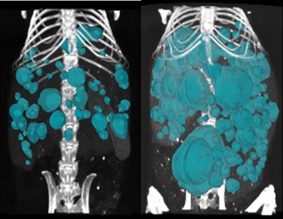A surprising tumor suppressor function
Hepatocellular carcinoma is a frequent and deadly liver cancer. The lack of efficacy of conventional treatments has led the scientific community to search for new therapeutic options. In that context, tiny non-coding nucleic acids called microRNAs appear to be a promising strategy, as they are able to regulate the expression of hundreds of genes at once.
The putative role of miR-21 in cancer
One particular microRNA, miR-21, is upregulated in almost all human cancers and is currently considered as one of the most potent oncogenic miRNAs. In the liver, researchers from Prof. Michelangelo Foti’s laborator have previously shown that miR-21 promotes metabolic dysfunctions preceding cancer. However, its role in the initiation and progression of liver cancer remains to date unclear.
The story is more complex…
In their recent study published in Cancers, researchers from Prof. Michelangelo Foti’s laboratory made a surprising discovery. Based on the current literature supporting an oncogenic role of miR-21, its absence or inhibition was expected to prevent or restrain liver cancer development. However, researchers have observed the opposite since genetic deletion of miR-21 in mice promoted cancer development as illustrated in the Figure below. This new discovery challenges the current dogma of miR-21 being an oncogene and calls for cautiousness when considering therapeutic targeting of this miRNA for liver cancer.

A deletion of miR-21 in the liver (right panel) promotes cancer development compared to mice expressing miR-21 (left panel). © From Figure 3 in Correia de Sousa et al. Cancers, 2021
14 Oct 2021
